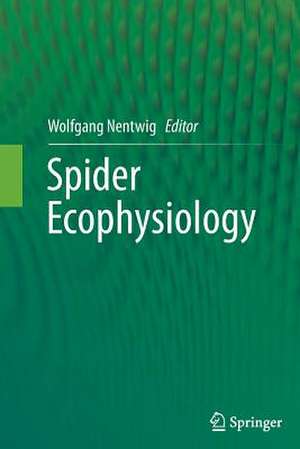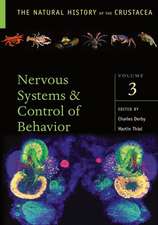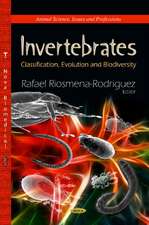Spider Ecophysiology
Editat de Wolfgang Nentwigen Limba Engleză Paperback – 6 mar 2015
Ecophysiology combines functional and evolutionary aspects of morphology, physiology, biochemistry and molecular biology with ecology. Cutting-edge science in spiders focuses on the circulatory and respiratory system, locomotion and dispersal abilities, the immune system, endosymbionts and pathogens, chemical communication, gland secretions, venom components, silk structure, structure and perception of colours as well as nutritional requirements. Spiders are valuable indicator species in agroecosystems and for conservation biology. Modern transfer and application technologies research spiders and their products with respect to their value for biomimetics, material sciences, and the agrochemical and pharmaceutical industries.
| Toate formatele și edițiile | Preț | Express |
|---|---|---|
| Paperback (1) | 1228.29 lei 43-57 zile | |
| Springer Berlin, Heidelberg – 6 mar 2015 | 1228.29 lei 43-57 zile | |
| Hardback (1) | 1233.20 lei 43-57 zile | |
| Springer Berlin, Heidelberg – 25 feb 2013 | 1233.20 lei 43-57 zile |
Preț: 1228.29 lei
Preț vechi: 1497.92 lei
-18% Nou
Puncte Express: 1842
Preț estimativ în valută:
235.06€ • 244.50$ • 194.06£
235.06€ • 244.50$ • 194.06£
Carte tipărită la comandă
Livrare economică 14-28 aprilie
Preluare comenzi: 021 569.72.76
Specificații
ISBN-13: 9783642443992
ISBN-10: 3642443990
Pagini: 540
Ilustrații: X, 529 p. 99 illus., 49 illus. in color.
Dimensiuni: 155 x 235 x 28 mm
Greutate: 0.75 kg
Ediția:2013
Editura: Springer Berlin, Heidelberg
Colecția Springer
Locul publicării:Berlin, Heidelberg, Germany
ISBN-10: 3642443990
Pagini: 540
Ilustrații: X, 529 p. 99 illus., 49 illus. in color.
Dimensiuni: 155 x 235 x 28 mm
Greutate: 0.75 kg
Ediția:2013
Editura: Springer Berlin, Heidelberg
Colecția Springer
Locul publicării:Berlin, Heidelberg, Germany
Cuprins
Respiration and Circulatory System.- Locomotion and Dispersal.- Immune system and pathogens.- Chemical Communication and Reproduction.- Venom.- Silk.- Colouration.- Nutrition.- Ecotoxicology.- Applications.
Textul de pe ultima copertă
With over 43,000 species, spiders are the largest predacious arthropod group. They have developed key characteristics such as multi-purpose silk types, venoms consisting of hundreds of components, locomotion driven by muscles and hydraulic pressure, a highly evolved key-lock mechanism between the complex genital structures, and many more unique features. After 300 million years of evolutionary refinement, spiders are present in all land habitats and represent one of the most successful groups of terrestrial organisms.
Ecophysiology combines functional and evolutionary aspects of morphology, physiology, biochemistry and molecular biology with ecology. Cutting-edge science in spiders focuses on the circulatory and respiratory system, locomotion and dispersal abilities, the immune system, endosymbionts and pathogens, chemical communication, gland secretions, venom components, silk structure, structure and perception of colours as well as nutritional requirements. Spiders are valuable indicator species in agroecosystems and for conservation biology. Modern transfer and application technologies research spiders and their products with respect to their value for biomimetics, material sciences, and the agrochemical and pharmaceutical industries.
Ecophysiology combines functional and evolutionary aspects of morphology, physiology, biochemistry and molecular biology with ecology. Cutting-edge science in spiders focuses on the circulatory and respiratory system, locomotion and dispersal abilities, the immune system, endosymbionts and pathogens, chemical communication, gland secretions, venom components, silk structure, structure and perception of colours as well as nutritional requirements. Spiders are valuable indicator species in agroecosystems and for conservation biology. Modern transfer and application technologies research spiders and their products with respect to their value for biomimetics, material sciences, and the agrochemical and pharmaceutical industries.
Caracteristici
Comprehensive reviews of all relevant recent research results
With contributions by renowned spider experts
Presents basic biological data and potential industrial applications
With numerous excellent illustrations
Includes supplementary material: sn.pub/extras
With contributions by renowned spider experts
Presents basic biological data and potential industrial applications
With numerous excellent illustrations
Includes supplementary material: sn.pub/extras








